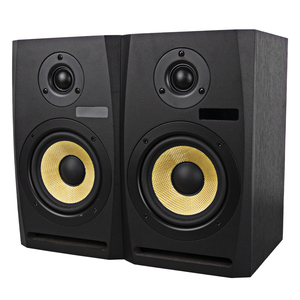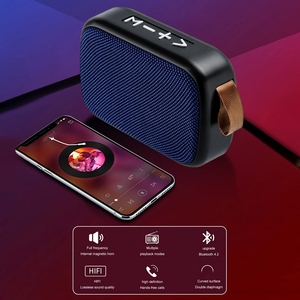Types of mini music systems
A mini music system is a compact audio system that plays music. Its small size allows people to put it in different places at home or in the office. A music system like this usually has an amplifier, a CD player, tape decks, radio tuners, and speakers. Its sound quality is better than that of a personal computer or a portable speaker. People connect their music sources, such as smartphones, and enjoy listening to songs of good quality. People also use other devices to get sound, like TVs or computers.
The mini music system comes in several types.
- CD and cassette players: Some designs have CD and cassette players. Users can listen to their favorite songs in these formats. They can also save new CDs and listen to the things on them later. The cassette player gives users the chance to enjoy songs that are on cassettes.
- Digital radios: Some mini music systems have digital radios. The digital radio gives clear sound. Users can listen to AM and FM stations. Many digital radios have extra features like alarm clocks, menus that allow users to choose options, and displays that show what is being tuned into.
- Portable speakers: Another kind of portable mini music system has DJ features. It has bright lights that flash and a digital radio with AM and FM that tunes in with good sound quality. These speakers also have Bluetooth. This allows them to connect with and play from a laptop or smartphone. The music system has inputs that allow microphones or instruments to be plugged in. This lets people show off their singing skills or make music. The speaker's battery lasts many hours on a charge. This allows it to be taken anywhere, from rooms at home to outside places like beaches and campsites.
- Bluetooth-enabled models: Many mini music systems have Bluetooth technology. This makes it easy to connect many personal devices. The systems give off good sound quality when music is played through Bluetooth.
- Home theater systems: A mini music system can also be a home theater system. In these cases, the music system has a DVD player or an HDMI connection. This allows great video and audio to be experienced when movies are watched on a TV. The system gives a viewing experience that is like a cinema.
Functions and Features
-
Audio Playback:
CD players, cassette players, and digital music sources like MP3 players or smartphones are included in mini music systems. This variety in sources provides users with multiple options for enjoying their favorite tunes, irrespective of their format accessibility, or preference.
-
FM/AM Radio:
Mini music systems have built-in tuners for AM and FM bands. With the radio, listeners can enjoy a range of programs, such as the latest news, sports channels, or some broadcasting arts, which can help with the understanding of what is going on in the world and provide entertainment when there is no time for the television set to be switched on.
-
Speakers:
The sound output of mini music systems is provided through speakers, which may either be built-in or separate units. The usual expectation of speakers in mini music systems is that they will offer a balance of decent quality and a compact size suitable for limited spaces.
-
Connectivity:
Modern mini music systems connect various digital devices using Bluetooth, USB ports, aux cables, and SD card slots. The wide range of connectivity options available has made sharing music from different devices much simpler.
-
Compact Size:
One of the mini music system's most distinguished and attractive features is its compact size, which makes it suitable for use in places with limited space, such as dorm rooms, offices, or small apartments.
-
User-Friendly Controls:
The presence of easy-to-use controls, which may include a power button, volume knobs, tuning dials, and playback controls, ensures that the system can be operated without any technical know-how being required.
Applications of Mini Music Systems
- Travel and outdoor activities: Mini music systems are lightweight and portable, making them suitable for use during travel, outdoor activities, picnics, and parties.
- Personal entertainment: People use mini music systems in their bedrooms or personal spaces to enjoy music, radio shows, and other forms of entertainment.
- Home office setup: Some individuals use mini music systems in their home offices to listen to music or podcasts while working.
- Kitchen or cooking area: Mini music systems are commonly found in kitchens or cooking areas, allowing people to listen to music or watch cooking videos while preparing meals.
- Dining or living room: Mini music systems are often placed in the dining area or living room, providing background music during meals or social gatherings.
- Bedside table: Having a mini music system on the bedside table allows people to listen to the radio or soothing music before sleep.
- Children's room: Mini music systems can be found in children's rooms, serving as a player for children's educational songs, stories, and music players for their parents.
How to choose a mini music system
Different buyers have different expectations of a mini music system. So, before making any purchase, it's best to consider the end user and their expectations. Here are some things to consider when choosing a mini music system.
- Sound quality: The sound quality is one of the most important factors to consider because the end user will enjoy their favorite tunes with the music system. Thankfully, a mini music system has multiple speakers that produce excellent sound quality, even at high volumes.
- Wireless connectivity: A mini music system is a compact, versatile solution for music enthusiasts. Moreover, most modern systems offer flexible, seamless listening experiences thanks to wireless connectivity options such as Bluetooth and Wi-Fi. Consider buyers who would love a system with wireless connectivity.
- Durability: Buyers would want a system that can stand the test of time. Consider a music system made with quality materials. Such a system can resist occasional falls and bumps. Also, consider a product that comes with long-lasting batteries.
- Brand reputation: The brand's overall reputation plays a major role when buyers are choosing a mini music system. Take some time to study consumer brand reviews and how different brands handle after-sales services. Ideally, brands that are well-rated are brands that promise and deliver good quality.
- Size and design: Buyers should consider a design that reflects their style and personality. Also, consider the location where the system will be kept. The typical buyer will choose a music system that will fit perfectly in the intended space.
- Additional features: Features like FM radios, CD players, and integrated speakers enhance the functionality of a music system. Buyers will want a system that has additional features.
- Cost: Cost is a serious consideration for many buyers. Buyers who are on a budget will consider a system that delivers a great cost-to-value ratio. Buyers will also consider the overall cost of ownership, which includes maintenance and repair services.
Q&A
Q1: What is a mini music system?
A1: The phrase ""mini music system"" refers to a compact stereo that plays and records audio. These typically include a CD player, cassette player, radio, and speakers.
Q2: Why are mini music systems popular?
A2: Mini music systems are famous because of their small size and high-quality sound. They may be utilized in living rooms or home offices, and their portability makes them practical.
Q3: How have mini music systems changed over time?
A3: The basic design of music systems has changed little, but systems now include USB ports and Bluetooth connectivity. Renovations have kept the music systems trendy and useful.
Q4: What benefits do mini music systems offer over computers and TVs?
A4: While TVs and computers offer blunt audio output, a well-placed mini music system offers clear and pleasant music. Also, mini music systems are less expensive than buying a TV and a computer.
Q5: Which features should people look for in a mini music system?
A5: Good sound quality, USB and Bluetooth connectivity, durable build, and brand reputation are some important features shoppers should consider.

















































































































































































































